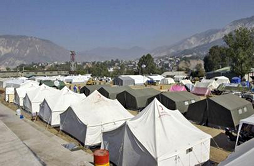Main content:
Internship Placements for Refugees

Vacancies for Internships and Volunteering
for Refugees with a Scientific Background
Scientifically qualified refugees often miss out on the opportunity to apply their knowledge in Germany, as relevant documents may have been lost, qualifications could not be completed, or the qualifications are not officially recognized. Regardless of these formal requirements, Global2030 offers placements for internships and volunteering for refugees that have achieved the necessary qualifications through study or relevant work experience. The only provision is the actual qualification. This gives refugees with a scientific background an opportunity to continue to work in their fields and to demonstrate their skills.
Since most of the available literature on the topics covered by Global2030 is written in English, a good level of English is required. German language skills are not a requirement (though it is possible to have verbal communication in German).
Internship vacancies: Unfortunately, remuneration for the placement is not possible. According to recent German law, enrolment at university is required. For internships, applicants should be able to commit for a minimum of 2 months and should be available for 20 hours per week. Alternatively, interns can work for 3 months and complete 13 hours per week.
Volunteering vacancies: For volunteering placements the enrolment at university is not required and the working arrangements are more flexible.
For both placements, certificates can be presented upon completion, which will describe the nature, topics, and scope of the scientific work the applicant has carried out. The results of the work are used in Global2030 releases and all those that contributed are named and acknowledged.
Global2030 addresses the most important global challenges. These include hunger, neonatal and maternal mortality, air pollution, climate change, poverty, epidemics, financial crises, armed conflicts, etc. Many of these problems are causes for displacement, fleeing and migration. Some of these themes are comprised in the Sustainable Development Goals (SDGs) that the United Nations have agreed to achieve by 2030. Global2030 identifies the most important global challenges highlighted through the use of indicators for mortality, loss of healthy life years (DALYs), environmental damages and economic losses. We create reports that give an overview of the global challenges and provide recommendations to overcome these. These reports are published for free and submitted to decision-makers in business and politics.
Applications should be sent via our contact form while the CV and motivation letter can subsequently be submitted via email.
